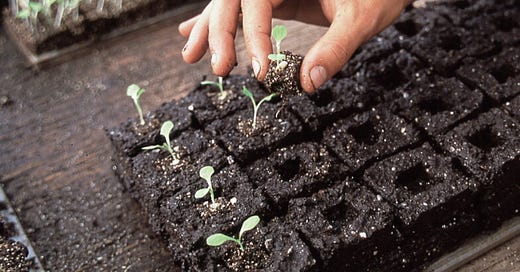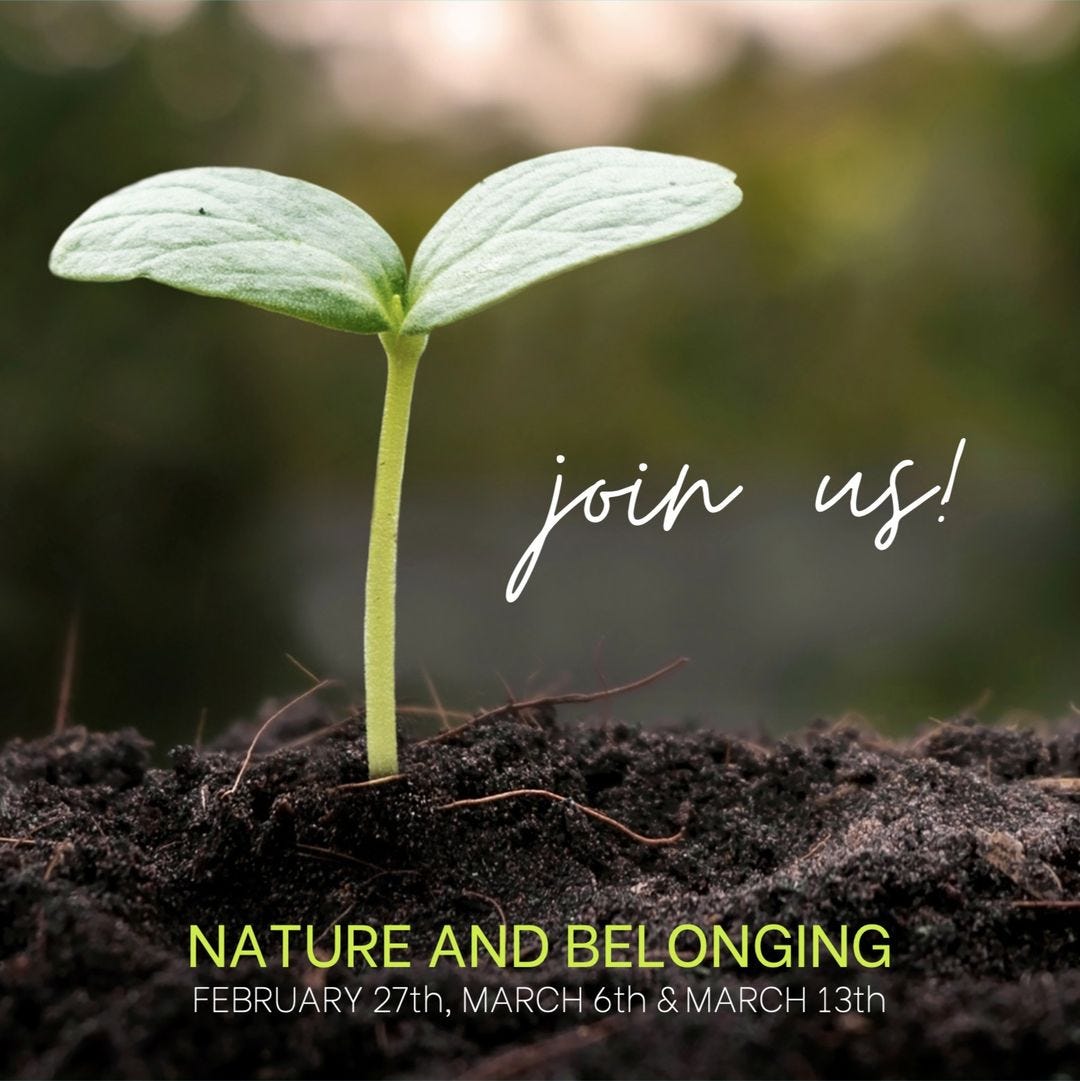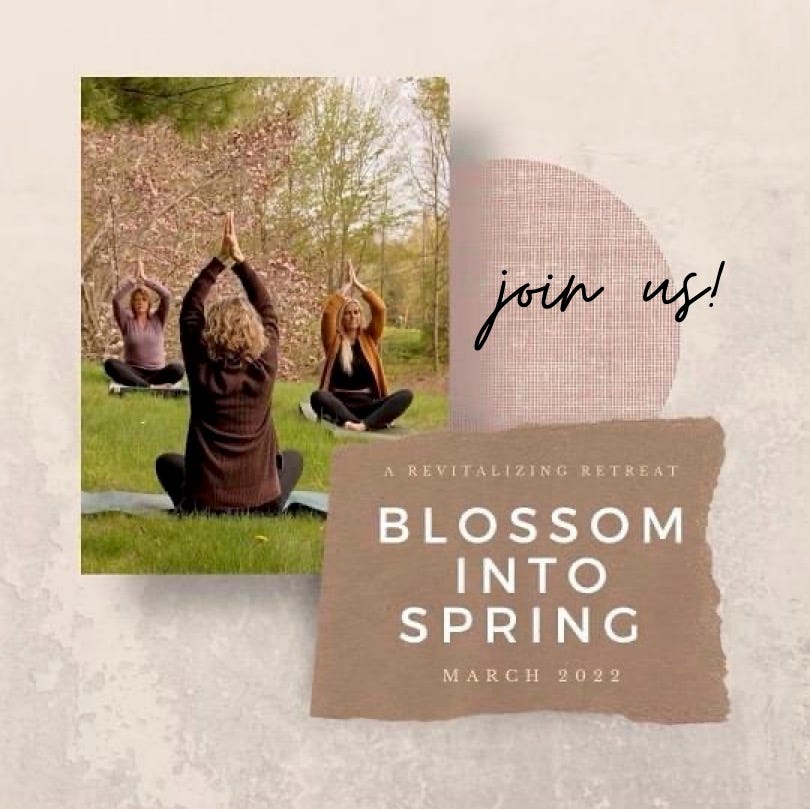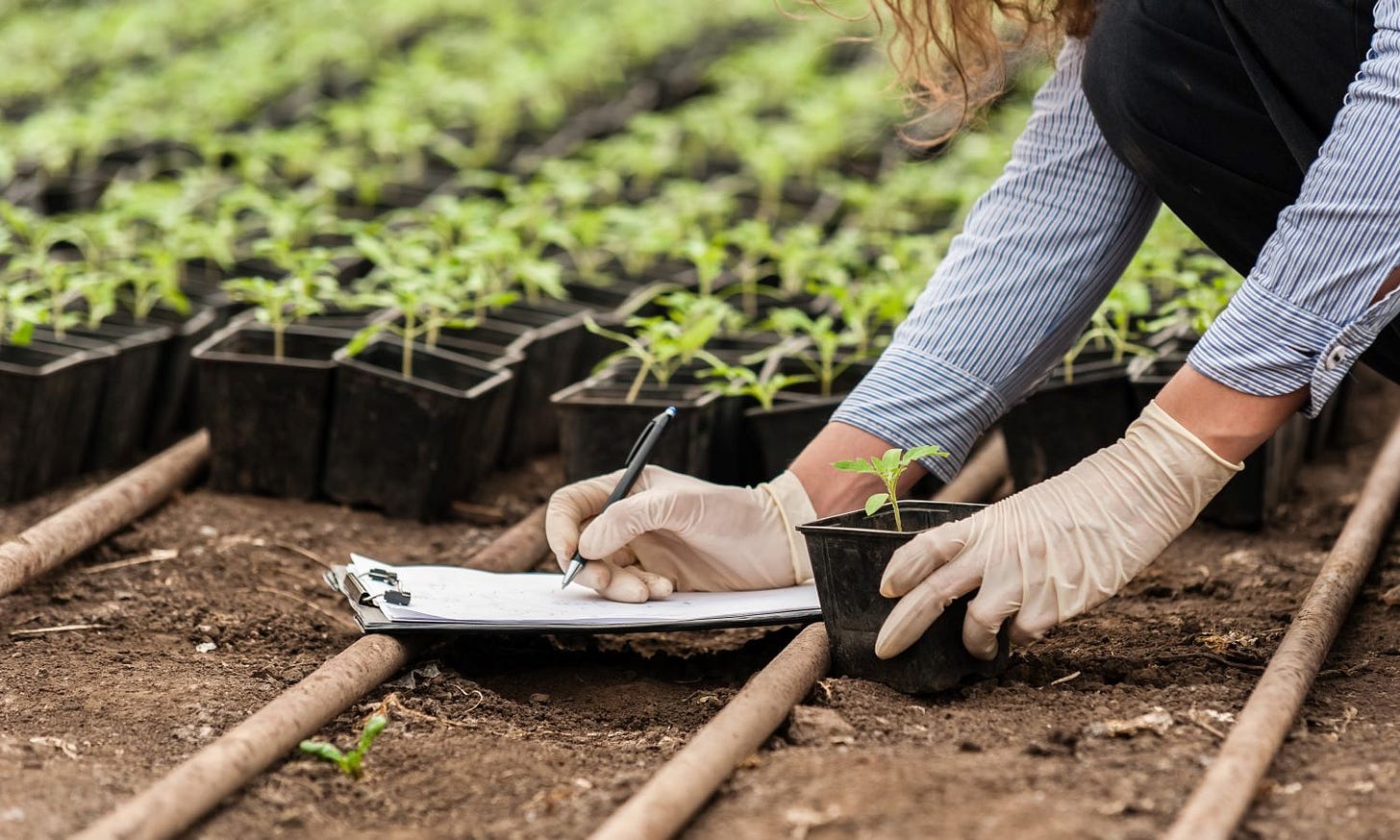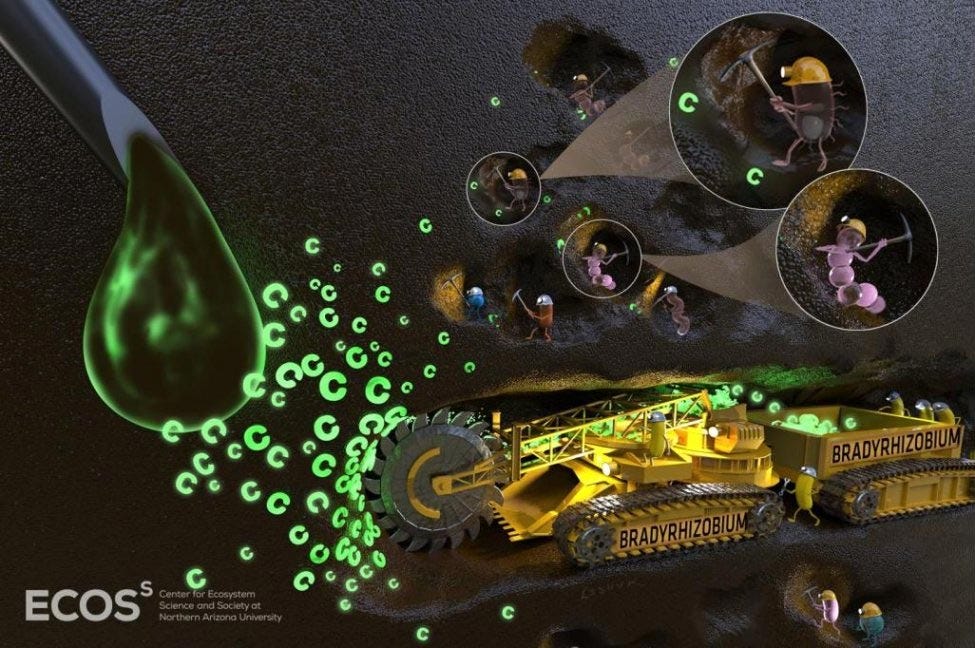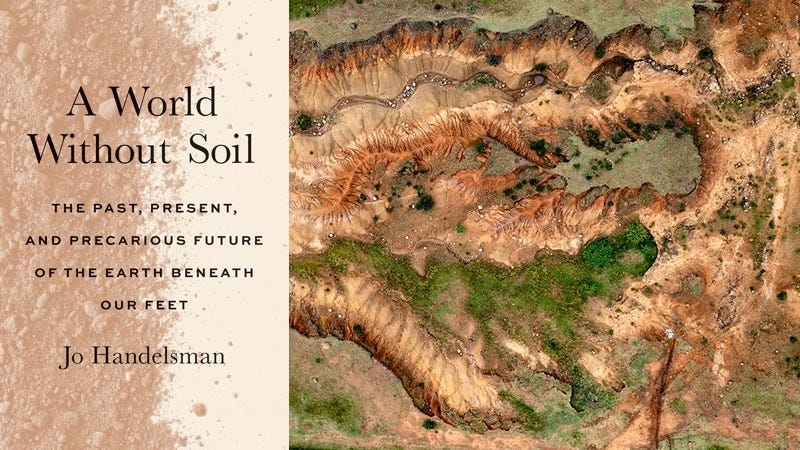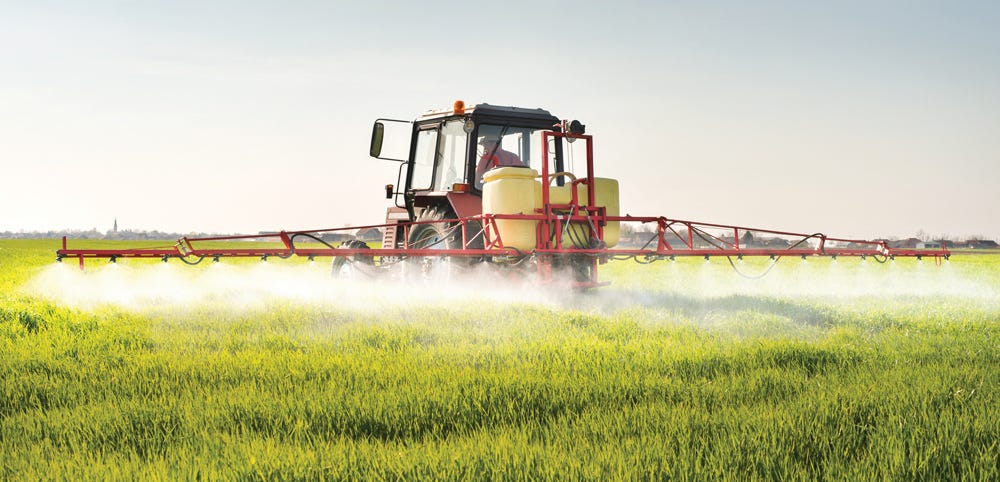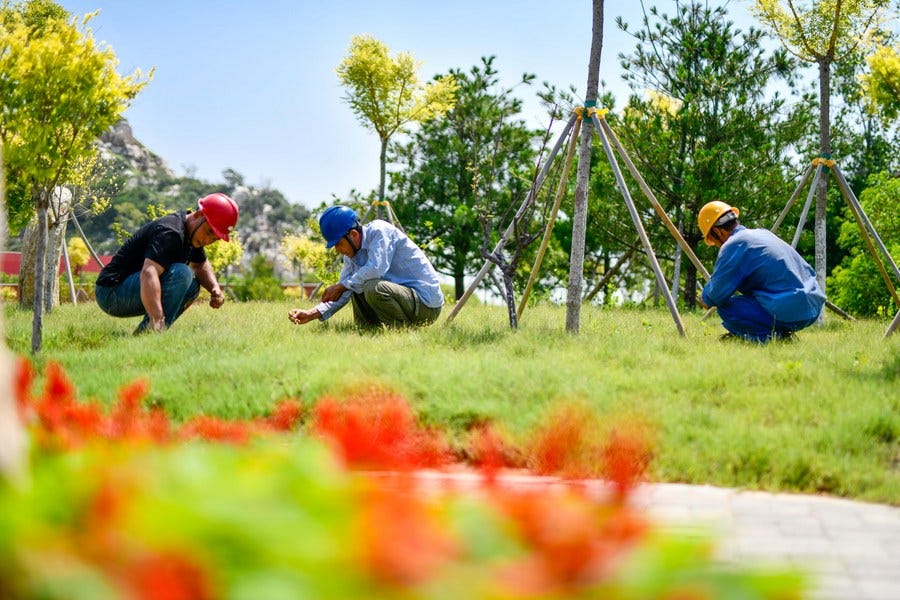The RēMind, No. 019: What's the Latest Dirt on Soil?
Updates from Rē / 1000 Farms Initiative / Farming and Dust Storms / Bacterial Carbon Cycling / A World Without Soil / Sounds of Soil / China's Soil Census / Mediterranean Soil Degradation / and More!
This week, Rē’s co-directors Ashlei Laing and Felix Bivens began preparations to soil block for our LOVE garden. Soil blocking is a technique that involves lightly compressing potting soil into blocks for transplant seedlings and seeds. Soil blocks serve as both the container and growing medium for growing seedlings, eliminating the need for plastic trays. Have you given any thought to what you are planting in your spring beds?
Discussions of soil got us thinking a lot about dirt, dust, and sediment. In this newsletter, we will share some recent news and research on soil: degradation, regeneration, global soil surveys, etc.
The Ecdysis Foundation announces the 1000 Farms Initiative to investigate regenerative agriculture across the U.S.
Civil Eats explores the the state of dust research and the role farmland plays in dust storm formation.
Scientists report only a handful of common bacteria gobble up most of the carbon in soil.
Emma Marris reviews Jo Handelsman’s new book, A World Without Soil and calls for government action.
A handful of scientists have started to train their ears to the worms, grubs and roots underground. Turns out, it’s not that quiet.
Researchers find that herbicide residues in soil harm plant hormones and plant-insect interactions.
China launches third national soil census to find out soil types and distribution.
A new study reports that the Mediterranean is the most susceptible region in Europe to soil degradation and desertification.
If you are interested in learning more, keep reading!
Updates from Rē:
TOMORROW: Nature and Belonging: Finding Connection Through Nature and the Senses
February 27, March 6 & March 13 (Live-streamed 90 minute classes)
LAST CHANCE TO REGISTER FOR 'NATURE AND BELONGING'!
Over the next three weeks, we will ground and re-build connection to place. Led by Empower with Nature, we will explore diverse concepts and use phenomenological techniques to engage our senses and heighten our levels of observation.
Only $50 for all three live sessions! As a RēMind subscriber, enter coupon code WELL20 on the registration page to receive a 20%/$10 discount!
To register, click here. Limited space available, so sign up now!
Blossom Into Spring: A Revitalizing Retreat
March 25-27, 2022 in Fayetteville, Tennessee
Just as winter is a time for rest, spring is a time for new growth and new beginnings.
At the Blossom Into Spring retreat, we will invigorate our senses and our souls as we come alive with the re-awakening of Mother Earth. We will use Ayurvedic dietary and herbal techniques to clear and open physiological and psychological channels in the body and mind.
Thana Nu of Nourish Me Wellness, Caitlin Smith of Within Wellness, and Ashlei Laing of Rē : The Regenerative school will be facilitating the weekend, holding space, and helping us bloom. Consider our invitation and lean into a beautiful, practice to clear the accumulated energies that no longer serve us.
All are welcome! No experience needed, only open minds. Join us!
Full weekend, day pass, and scholarship registration available! For more information and registration details, click here or visit our Facebook event page.
LOVE Garden Soil Blocking
Spring planting for the LOVE and Peace Gardens is coming soon! It’s time to get our seeds going now so that we can transplant vigorous seedlings when warmer weather arrives.
This year we are using the soil block technique rather than conventional cell trays. This is a great way to reduce plastic usage in your growing. This technique involves a soil blocking tool, shown in the photo above, that creates compressed blocks of potting soil. The blocks serve as both the growing medium and the container. Many growers actually prefer soil blocks to cell trays because transplanting causes less stress to plant with no damage to the roots.
Soil blocking is simple, cost-effective, environmentally regenerative!
Want to learn more? Check out this article from Cornell University. It provides a detailed breakdown of soil blockers, choosing/making your potting mix, selecting seeds and guidance on making and tending the blocks.
The 1000 Farms Initiative Investigates Regenerative Agriculture Across the U.S.
By Morgane Batkai for Food Tank, January 2022
“This project is intended to… show that no matter what you grow, or where you’re growing, regenerative works,” says Dr. Jonathan Lundgren, Director of the Ecdysis Foundation. The Ecdysis Foundation is launching a study that aims to investigate regenerative agriculture across the United States. The 1000 Farms Initiative is one of the largest projects to date that will gather data on agricultural management practices, soil and water health, biodiversity, and profits on more than 1,000 farms and ranches. Click here to read on.
Dust Is A Growing Problem. What Role Does Farmland Play?
By Virginia Gewin for Civil Eats, 6 January 2022
In recent years, more and more of us consult air quality when we look up the weather. Droughts, winds, wildfires all seem to decrease visibility and increase concern. Scientists are working to understand “the chaotic cascade of dynamics that causes a dust storm to initiate a particular point in space and a particular point in time,” says Thomas Gill, a dust researcher at University of Texas at El Paso. His research points to agriculture as an important source to watch. Click here to continue reading.
Bacterial Carbon Cycling in Soil Is Not a Shared Effort
By U.S. Department of Energy for SciTechDaily, 23 January 2022
In a new study, scientists found that just a few types of bacteria use more than half of the available carbon in many soil environments. Despite being home to thousands of species, only three to six groups of bacteria were responsible for most of the carbon use in several tested soils. To better understand future climate dynamics, scientists must predict how microbial activity stores carbon in soil or releases it as carbon dioxide into the atmosphere. Click here to read more.
A Call for Governments to Save Soil (Book Review)
By Emma Marris for Nature, 24 January 2022
“We need to change how we think of farming. We have already begun to move towards a model in which farmers are less independent businesspeople growing and selling food, and more government-supported land stewards managing a complex mix of food production, soil fertility, wildlife habitat and more,” writes Emma Marris after reading A World Without Soil: The Past, Present, and Precarious Future of the Earth Beneath Our Feet. Jo Handelsman’s 2021 release (Yale University Press) addresses a soil loss crisis accelerated by poor conservation practices and climate change. Read the book review here. Order the book here.
Life In The Soil Was Thought To Be Silent. What If It Isn’t?
By Ute Eberle for Knowable Magazine, 9 February 2022
Today, in a relatively new field known as soil bioacoustics, a growing number of biologists are capturing underground noises to open a window into the complex and cryptic world that lays beneath our feet. “Eavesdropping on this cacophony of underground sounds promises to reveal not only what life forms reside below our feet but also how they go about their existence — how they eat or hunt, how they slither past each other unnoticed, or drum, tap and sing to get one another’s attention.” Click here to learn more.
Herbicide Residues In Soil Effect Plant Hormones
By University of Turku for Phys.Org, 14 February 2022
A recent study investigated the effects of herbicides on plants and plant-insect interactions. Herbicides are commonly used to kill weeds before crops are sown on agricultural field. It was assumed that the chemicals in herbicides degrade quickly in soil with little to no effects on the crop plants. However, poor soil health and decreased plant resilience was noted in soils with herbicide residues. Read more about the implications of this study here.
China's Launches Third National Soil Census
By XinHua Net, 16 February 2022
China has decided to conduct the third national soil condition census from 2022 to 2025. The census aims to find out soil types and distribution around the country, as well as current status and changing trends of soil resources, while acquiring basic data such as soil quality, properties and utilization status, in order to improve protection and utilization of soil resources. The census will target soil of arable land, garden plots, forest land, grassland and other agricultural lands around the country including some unused land. To continue reading, click here.
Mediterranean Soil Is Reaching A Critical Limit
By Carly Cassella for Science Alert, 20 February 2022
A recent publication by a European commission on soil health found up to 70 percent of soils in the European Union were losing the capacity to provide crucial ecological functions. The shallow soils of the Mediterranean are particularly susceptible to seawater intrusion, erosion, drought, and wildfires. The Mediterranean has the highest erosion rates in the EU and the lowest levels of soil organic matter. Experts warn that the combined effects of unsustainable land practices and climate change have depleted a finite resource to a critical point. To read the press release, click here.
So that’s the current dirt on soil! As always, we at Rē are grateful for your attention and support. If you liked this newsletter, consider donating at https://regenerativeschool.org/redonate/
Thank you and see you soon!

